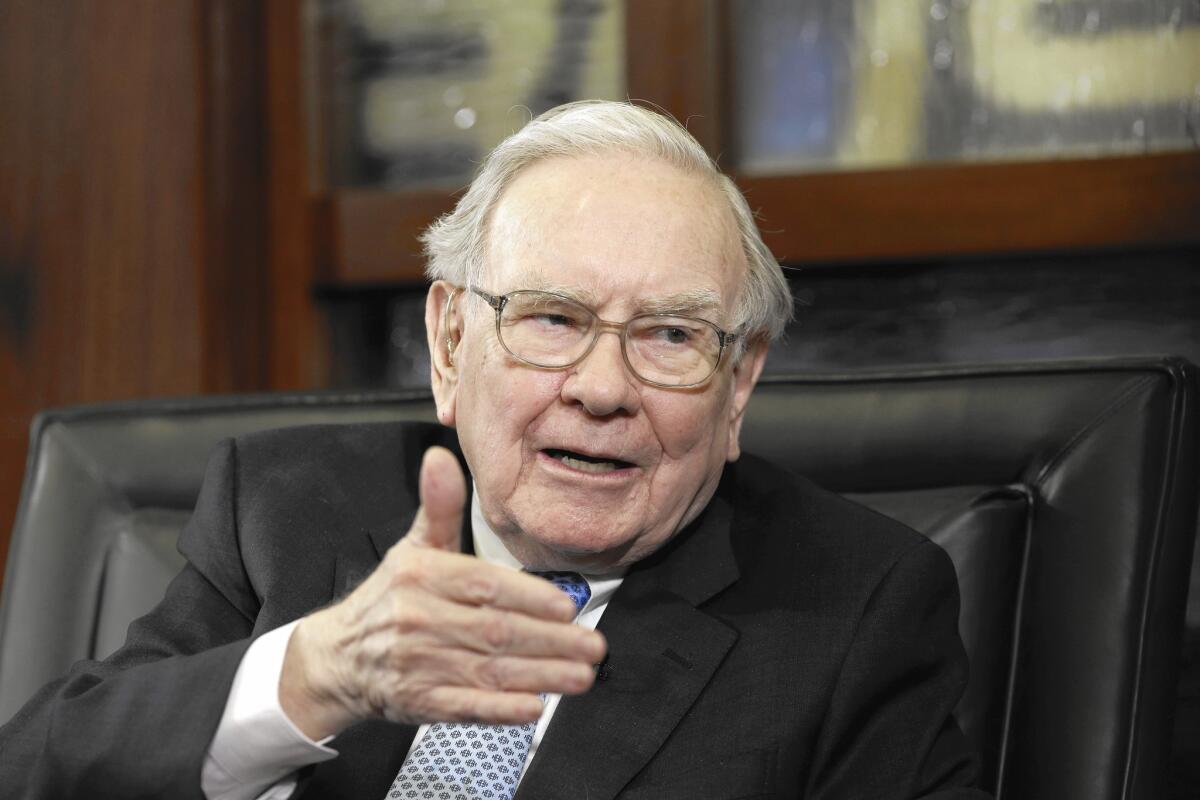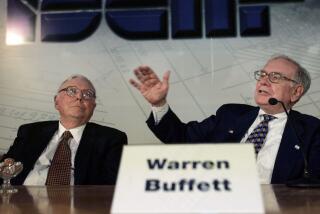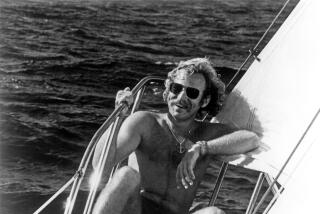Business Bookshelf: Dishing up Buffett’s business model

Warren Buffett has acquired so many companies over the years that Berkshire has eclipsed General Electric to become the largest conglomerate in the U.S., worth more than $350 billion.
- Share via
Warren Buffett likens the companies he buys to works of art.
Sell your business to us, he once said, “and we’ll put it in the Metropolitan Museum. It’ll have a wing all by itself; it’ll be there forever. Or you can sell it to some porn shop operator, and he’ll take the painting and he’ll make the boobs a little bigger and he’ll stick it up in the window, and some other guy will come along in a raincoat, and he’ll buy it.”
In one delicious metaphor, the investor summed up what makes Berkshire Hathaway, his holding company, so different from private equity, highlighting too how it differs from the shape-shifting conglomerates that have come before it.
Buffett has acquired so many companies over the years that Berkshire has eclipsed General Electric to become the largest conglomerate in the U.S., worth more than $350 billion.
Just recently he added Duracell, the battery maker. Now his operations span railways, insurers, power utilities, estate agents, industrial manufacturers, car dealerships, furniture retailers, fast food, newspapers … the list goes on as Buffett refuses to sell any subsidiaries, tarted up or not.
In his new book “Berkshire Beyond Buffett: The Enduring Value of Values,” author Lawrence Cunningham argues this sense of Berkshire as a permanent home — “an orphanage for the corporate homeless,” the author calls it — is the glue holding the company together — every bit as strong as its 84-year-old founder’s personality.
The book, published by Columbia University Press, is a timely contribution to a swelling debate. Wall Street bankers, frozen out of Buffett’s dealmaking, salivate at the prospect of dismantling Berkshire when he is gone.
But E is for “eternal” in the final letter of Cunningham’s acronymic description of the company’s culture, which knits Berkshire’s businesses together and which he argues will enable it to repel such break-up talk.
All its businesses and executives are BERKSHIRE: budget conscious, earnest, reputation obsessed, keen on kinship, self-starters, hands-off (with no operational interference from head office), investor savvy and rudimentary (as in they eschew complexity), as well as eternal.
The formulation may be clunky, but there is no denying the depth of the dive into the company.
Cunningham, a professor of business law at George Washington University, is the author of numerous books on value investing and the authorized editor of “The Essays of Warren Buffett.”
Executives from dozens of Berkshire subsidiaries cooperated with this latest work, and it achieves an encyclopedic history of the group’s operating businesses.
It is a book peopled with great entrepreneurs and progressive bosses of businesses built over generations — the best of U.S. capitalism.
It argues that Berkshire’s essence is that of a family business, run by executives who consider themselves owners nurturing the company for the next generation, rather than hired hands. Shareholders, recipients of Buffett’s witty and wise annual letters, think of themselves as long-term partners.
Yet at every turn, there are reminders that these traits spring directly from the company’s charming founder, and Cunningham risks making the opposite case: that Berkshire is Buffett.
Executives talk of the bond of loyalty they feel to Buffett. While star-struck American business owners have sought out and sold to him at below-market prices, Berkshire has been largely frustrated in its attempts to find acquisitions outside the U.S., where he is less known.
In the end, no book about Berkshire’s culture could fully make the case that the company will endure. No company is really a museum; it does not have to be a porn shop, but it might be a gallery, trading its works.
The real question is, or ought to be, one of capital allocation: whether money that Berkshire could raise by selling its businesses might be more lucratively invested elsewhere, either inside the company or after it is returned to shareholders.
It is also a question of relative valuations, of whether pieces of Berkshire might be worth more separately.
Put another way, how much value are Berkshire shareholders willing to leave on the table to keep its promise of permanence? The answer is certainly different beyond Buffett.
Stephen Foley is U.S. investment correspondent for the Financial Times of London, in which this review first appeared.
More to Read
Inside the business of entertainment
The Wide Shot brings you news, analysis and insights on everything from streaming wars to production — and what it all means for the future.
You may occasionally receive promotional content from the Los Angeles Times.










